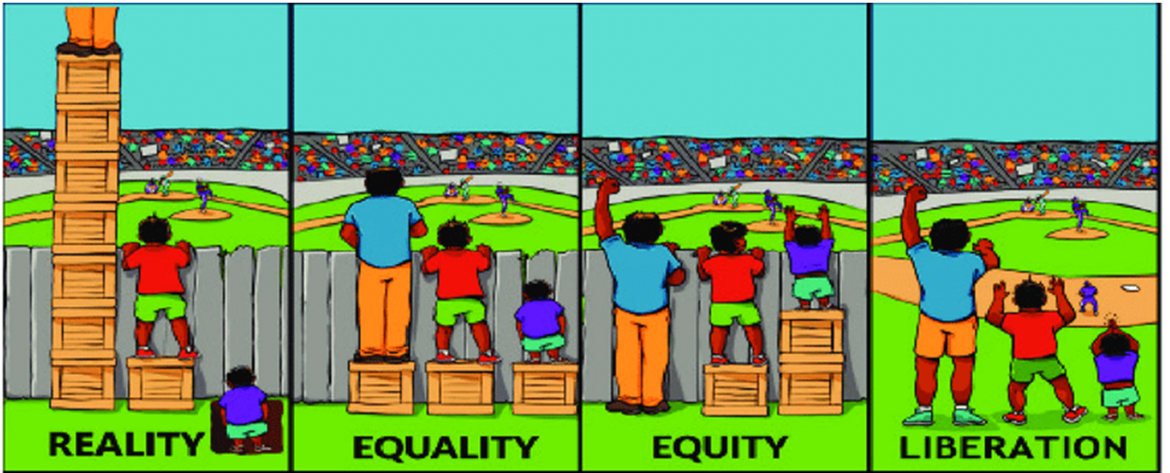
As an assessment specialist with a deep passion for equity work, I stand firm in the belief that the more one knows, the more one sees. For this reason and more, it was a pleasure to join in Dr. Divya Bheda’s SAAL Structured Conversation, “Exploring New Frontiers Together: Taking Equity Work to the Next Level in Student Affairs and Beyond.”
With a zealous interest in community knowledge, Dr. Bheda thoughtfully centered black feminist scholars, indigenous scholars, and our shared experiences within higher education assessment. Her presentation, from the start, served as a model in how we can move away from western practice in presenting– launching with a collective energy check-in (rating on scale of a “sad” to “happy” face with exchange) and then storytelling (“My roots, my influences, my background, my goal”).
Dr. Bheda first highlighted a disconnect between intent, action, and impact in higher education assessment. She followed in asking each attendee to individually define the purpose of assessment. Our aggregated responses showed a couple of findings: 1) we come with varying definitions on assessment’s purpose, 2) no participant spoke on accreditation.
This was an appropriate segue, as Dr. Bheda began to walk us through her framework of advancing beyond equity in assessment– first, with moving from accreditation compliance to institutional responsiveness. She referenced Alnoor Ebrahim’s (2010) theory on our “responsibility to accountability partners.” As typical institutionalized norms have staff looking upwards towards accreditors, horizontally towards colleagues, and downwards towards community partners, Ebrahim argues that if we put our energy towards our community partners and colleagues, our “upwards” responsibilities will be fulfilled through a “trickle-up effect” (2010). In applying Ebrahim’s theory, Bheda urged participants to move away from catering our data-framing to accreditors, and rather look to our community partners (usually students).
In the Office of Planning, Assessment, and Data Analytics at CU Boulder, we have made the intentional choice to display our large survey data publicly through Tableau– building institutional responsiveness by removing the barrier of our survey data to respondents (students, campus affiliates, etc.). Previously using PowerBI, a software only accessible to those with licenses, we recognized that the overwhelming majority of our survey participants would never see the results of their time, effort, and feedback. Publicizing data through Tableau allows our office to be more accountable and equitable in our distribution, as well as provide participants with greater campus context.
That said, moving from accreditation to institutional responsiveness is easier said than done, and this is reflected in our struggles to do so. Systemic forces remain at play through inaction, learned helplessness, meritocracy, and more. On this truth, Dr. Bheda underscored the importance of recognizing and pushing back on these forces when they reverberate in our own work.
As DEI becomes an institutional imperative, it is also important to question and acknowledge the way the initiative is framed. Dr. Bheda models this, moving her priority of data equity towards liberation. She outlined,
Engaging with the First Nations Perspective pyramid (which preceded and was directly studied by Maslow), Dr. Bheda referred participants to the base of the pyramid, which lists “self-actualization” (Ravilochan, 2021). Taking on the First Nations/Blackfoot Perspective, assessment folks must first appreciate our students as whole human beings. For example, if Pacific Islander students at a university all report a low level of sense of belonging, this is not a reflection of the students, but on the institutional environment of the students.

Through community-building work like this conversation (or this blog), we may better raise the ways that we, in assessment, unintentionally uphold institutional inequity. We may also find that these spaces are opportunity-builders. The ideals above are near impossible to implement alone. In order to maximize learning and positive institutional change, dialogue is critical. Moreover, in SAAL, we have the unique position of being a part of a community with a national scope. Perhaps there is no better place to be sharing knowledge, questions, and unfinished thoughts. Let’s talk about data disaggregation techniques, data sharing, policy analysis, equitable reporting, working with community partners, flagging and connecting survey respondents to appropriate support, creating proactive over reactive priorities, effective storytelling, and getting a seat at the table of institutional decision-makers. How does your campus, your office, your role, take equity work to the next level?
These issues are not new, and will likely continue to change shape. That said, this is no reason to lose heart, nor grow complacent. As Dr. Bheda closed, we must still find ways to “open the door for possibilities and action” (2023).
Blog written by Sydney Kayne, Assessment Specialist at the University of Colorado Boulder and blog team writer
References
Ebrahim, A. (2010). The many faces of nonprofit accountability. In Renz, D.O. (Ed.), The Jossey-Bass handbook of nonprofit leadership and management (pp. 110-121). Jossey-Bass.
hooks, b. (2000). All about love: New visions. William Morrow.
Ravilochan, T. (2021). The Blackfoot Wisdom that Inspired Maslow’s Hierarchy. Resilience. https://www.resilience.org/stories/2021-06-18/the-blackfoot-wisdom-that-inspired maslows-hierarchy/
Samuga_Gyaanam+Bheda, D. (2023, April 11). Exploring New Frontiers Together: Taking Equity Work to the Next Level in Student Affairs and Beyond [Webinar]. Student Affairs Assessment Leaders (SAAL) Structured Conversations. Online. http://studentaffairsassessment.org/structured-conversations
